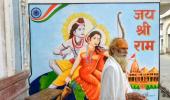'Unless Justice Chandrachud's judgment is (over)turned, there is no end to it.'

The Ram Janmabhoomi movement gained momentum after the Rajiv Gandhi government's knee-jerk reaction to the Shah Bano case in 1985, leading to cascading communalism in the country, former Delhi lieutenant governor Najeeb Jung said on Monday.
Jung was speaking at the Bhogilal Leherchand & A D Shroff Memorial Lecture in Mumbai. He was in conversation with journalist Shekhar Gupta on 'Ethics & Communal Harmony -- Impact on Sustainable Development and Economy'.
"Knee-jerk reactions of that government brought cascading communalism in this country. Ram Janmabhoomi was a 100-year-old movement, but it gained momentum after the Shah Bano case," Jung said.
In 1985, the Supreme Court passed a judgment in the Shah Bano case, by which a destitute, divorced wife would be entitled to maintenance after divorce pertaining to Muslim women.
However, the Rajiv Gandhi government enacted the Muslim Women (Protection of Rights on Divorce) Act, 1986, which set aside the Shah Bano verdict.
Meanwhile, the locks of the Babri Majid, on which there was a dispute over the presence of a temple in the past, were opened around the same time in February 1986 on the orders of the district court of Faizabad, leading to a controversy.
Jung expressed his disappointment with former Chief Justice D Y Chandrachud's verdict on the Ram Mandir, adding that it would create further problems within the country.
"The problem will be that unless there is a review petition and Justice Chandrachud's judgment is (over)turned, there is no end to it. There are 1,800 such mosques that are disputed in this country," he added.
These instances cannot be accounted for the building blocks of a society that hinged itself on social harmony, Jung asserted.
"These are not helpful in any way for our economic development," he said.
Meanwhile, he added human rights abuses, routine in counties under authoritarian rule, resulted in poorer development for its citizens.
"An ethical community recognises and respects the dignity and agency of an individual's identity irrespective of one's caste, creed, religion, gender or social orientation," he said.
while a functioning democracy might appear slow on decision-making as compared to its authoritarian peers, he argued these disadvantages were transient in nature.
"A functioning democracy is more deliberative, electoral processes manage social conflicts better, and lend stabilising legitimacy to policy decisions ..." he said.
On initiatives to counter polarisation in the country, Jung added politicians casting aspersions on religions and castes must be banned from politics, and those involved in corruption and criminal cases should be barred from the electoral process.
However, he said while these elements seemed straightforward, one must catch "the bull by its horns".
"If we don't speak or write about it ... we will end up destroying the country on caste and religious lines."
Feature Presentation: Rajesh Alva/Rediff.com











 © 2025 Rediff.com -
© 2025 Rediff.com -